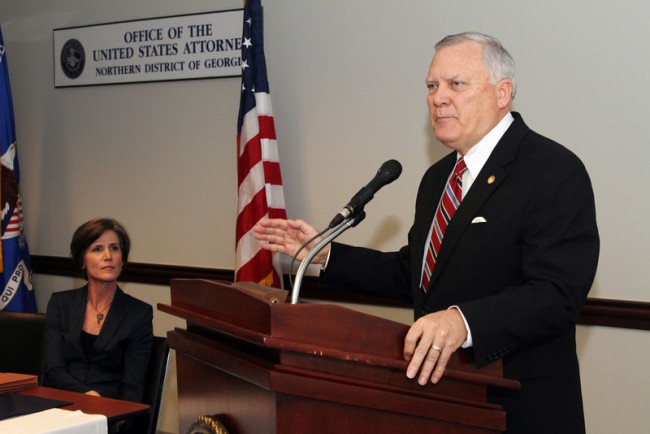by Georgia Center for Opportunity | Mar 8, 2014
Yesterday, Georgia Justice Project (GJP) hosted a lobby day at the Capitol which aimed to “enhance the chance” for Georgians with a criminal record to find employment. Concerned advocates traveled from as far as far as Albany to the State Capitol to voice their support for SB 365, a bill which captures a number of recommendations made by the Governor’s Special Council on Criminal Justice Reform to increase employment opportunities for ex-offenders (read the report here).

Before the 125+ advocates who attended the GJP’s Lobby Day met with legislators, the team at GJP provided a brief run-down of what the bill says, how the legislative process works, and what to say when talking with one’s legislator. Information packets were handed out explaining the nuts and bolts of SB 365, making it as easy as possible for participants to advocate for the recommendations made in the bill.
It a nutshell, SB 365 makes three important reforms that will assist ex-offenders in obtaining employment: (1) It mandates that private background check agencies update their criminal history information on a monthly basis and permanently delete any records that have been restricted or of persons who have been exonerated (absolved from guilt); (2) It protects employers from being accused of negligent hiring if they hire ex-offenders who have received a Program and Treatment Completion Certificate or a pardon; (3) It gives judges discretion in determining whether an offender’s license should be suspended or not for a non-driving-related drug offense.
After the brief orientation, advocates headed to the House Chamber to speak with their representatives. Staff at GJP and other volunteers instructed advocates on how to page their legislator at the ropes outside of the chamber in order to speak with them.
I had the chance to speak with Rep. Tom Rice (R-95) from Norcross about SB 365. Rep. Rice spoke in favor of the bill and mentioned that he has seen virtually no opposition to it in the House. His remarks confirm what we saw in the Senate last Thursday, February 26, as the bill passed unanimously with a vote of 53-0. The bipartisan support for this bill is strong as both parties acknowledge the importance of removing unnecessary obstacles to employment for those who carry a criminal record.
GJP’s Lobby Day at the Capitol finished as Executive Director Jay Neal of the Governor’s Office of Transition, Support, and Reentry addressed the group of advocates who participated in the effort. He expressed his appreciation for people coming out to voice their support for reforms that will improve the lives of those who carry a criminal record. Neal, who is passionate about this issue, shared with the group the effort that the Governor’s Office is putting forth to improve the reentry strategy in communities across the state. He mentioned that Georgia has done in four months what it took Michigan to do in two years – a state that is largely regarded as a national leader in recidivism reduction. Georgia has been to do this because of the broad support these reforms have received from the top-down.
Neal shared with the group that nine years ago the state had 64,000 people in prison or in jail. Today, this population has been reduced to 55,000 people – a savings of nearly $190 million to the state (the average cost of incarcerating a person in Georgia is $21,039 per year). Furthermore, of the 9,000 people released over this time period, 1,000 people were released in just the past month. The majority of these releases are low-level, non-violent offenders who are better-off receiving treatment under community supervision than within prison. These reductions allow the state to reserve expensive prison beds for offenders who pose the greatest threat to public safety.
Much of the success that the state has experienced in reducing prison costs and increasing public safety has taken place through recommendations made by the Criminal Justice Reform Council during the past three years. The council’s recommendations have served as a powerful guide for realigning Georgia’s criminal justice system with evidence-based practices nationwide.
As statewide collaboration continues to take place from the Governor’s office to local community service providers, there is good reason to believe that Georgia will continue to see positive outcomes in offender reentry in the coming years.
by Georgia Center for Opportunity | Mar 3, 2014
For many prisoners reentering society, debts and the inability to save money while in prison create serious obstacles to a successful transition. This debt usually comes in the form of child support arrears, restitution, and various court fines and fees that result from their conviction.
 Photo courtesy of pixabay.com In
Photo courtesy of pixabay.com In
Georgia, offenders are released from prison with only $25, a change of clothes, and a bus ticket. Meanwhile, they may likely carry tens of thousands of dollars in debt as well as the mark of a criminal record, making their prospects of securing a job and housing very difficult.
Because of this fact, offenders usually struggle to provide for their own basic needs upon release, much less service the debt they have incurred as a result of their felony. These offenders transition from a place where all their basic needs were provided by the state, to a situation where their subsistence depends largely upon their ability to get a job. Having been out of the job market for potentially several years, simply affording rent payments, buying food and clothing, and covering transportation expenses can be remarkably difficult. Often additional liabilities, such as child support payments, make circumstances even more difficult, leaving an offender little to no money to spare for the repayment of debts.
Still the demand placed upon offenders to repay their debts and obligations is high, and the penalty for not complying can be stiff. A person under parole supervision in Georgia can be revoked and re-incarcerated for failure to pay child support, restitution, or parole supervision costs.[i] An offender may not be intentionally avoiding paying these costs, but simply not have the means to do so – especially when they have spent the last several years in prison with no means of earning income.
As a result, an inordinate amount of debt can discourage offenders from making current payments (i.e. child support), encourage them to seek illegitimate sources of income, or lead them to abscond.[ii] These responses are harmful for all stakeholders in the community, as unpaid debt and obligations leave children and mothers without financial support, victims lacking financial compensation, and taxpayers burdened with the cost of debt collection, legal fees, and re-incarceration. Moreover, such responses inhibit offenders’ rehabilitation by preventing them from amending past actions and accepting current roles and responsibilities within their families and communities.
It is important for the state to consider how various debts and obligations present unique barriers for offenders reentering society, and to work where feasible to remove those that are unnecessarily punitive. In this way, the state could encourage offenders to meet current obligations and develop a realistic plan for repaying what is owed.
Endnotes
[i] Jake Arbes, “How Parole Works in Georgia,” Jake Arbes Attorney at Law, accessed March 3, 2014, https://www.arbeslaw.com/how-parole-works.html.
[ii] Vicki Teretsky, Staying in Jobs and Out of the Underground: Child Support Policies that Encourage Legitimate Work, CLASP Policy Brief, March 2007.
by Georgia Center for Opportunity | Feb 11, 2014

Georgia State Capitol image via Wikipedia
By Jacob Stubbs, GCO Legislative Intern
While I was a government major as an undergraduate, I had never really encountered anything close to actual politics. This is not necessarily a bad thing, for I was quite interested in the philosophical systems that underlie the beliefs that shape political action. With this focus, I did not take the general classes over political parties, the legislative branch, etc.
Following my time as an undergraduate, I served as a Fellow at the John Jay Institute where I read more political theory and continued to discuss the philosophy that underlies political science. When GCO approved my internship, I was quite nervous about actually encountering practical applications of political science. My professional mentors were all in agreement that this internship would be a great experience for me to finally be able to come down from the clouds and actually apply what I had been learning in a practical way.
When I started work at the Capitol, I realized that, despite my reading and research for the previous few weeks, my impression of how the political system worked was rather off base. For example, I was not aware of the amount of lobbyists that I would encounter. Reflecting on this with Eric Cochling, GCO’s Vice President of Policy Advancement, I was told that there were about 1000 lobbyists currently registered in the state of Georgia. Certainly, I would not have initially guessed this.
Though I did not expect to hear politicians talking about Plato’s Just City in Speech and its anti-utopian warnings, I was still a little surprised at how practical the discussions actually were. It makes sense that any discussion of Plato or Aristotle or virtue ethics would be out of place when you’re trying to determine how much money the state should allocate toward education expenditures. That being said, there have been certain “theoretical” discussions in some of the committee meetings I’ve attended thus far, such as issues of federalism, private property, and the extent of free speech. Furthermore, even deeper theoretical issues such as personal autonomy and privacy, have begun to make an appearance. Sorting through these issues on a more practical level has been refreshingly instructive in furthering my political education.
In terms of the legislative process, I have been quite amazed at how democratic everything actually is. Average citizens can come to committee hearings and register to give testimony as to how the bill at hand would affect them and their life. In one recent committee hearing, I heard concerns voiced from people whose case led to the bill’s introduction, as well as parents and various professional organizations who would be affected by the provisions in the bill. While I am sure that there is a certain forum for this in Washington, the fact that my family or neighbors can step into one of these committees to give their opinion on the legislation truly shows that state politics influences our everyday lives more than we may think.
The range of the General Assembly’s influence is not a bad thing, in my opinion. Recently, I asked a lobbyist if he had ever considered working in Washington. He expressed his love of state politics and assured me that the state politicians are intensely concerned with bettering the lives and situations of their constituents, not winning some political argument or jockeying for a better committee appointment. This lobbyist’s impressions helped reassure me that I was not naïve in my assessment of the political climate under the Gold Dome. While there may be some intense disagreements about the best ways to go about healthcare and other policy concerns, these disagreements reflect a care for the common man and a love for the particular. Certainly, the national political scene can quickly leave one jaded; however, my experience under the Gold Dome thus far has reinvigorated my interest in politics and my faith in the political process.
______________________________
Jacob Stubbs is a Georgia native who graduated from Berry College in May 2013 with a double major in Government and Philosophy. He has recently completed a fellowship at the John Jay Institute in Philadelphia, PA, and is currently serving as the legislative intern at Georgia Center for Opportunity. Following his time at GCO, Jacob is hoping to seek further graduate education in either political science or philosophy.
by Georgia Center for Opportunity | Feb 7, 2014
In a recent article addressing school choice alternatives – particularly the Georgia Tax Credit Scholarship program and its $58 million annual cap – some integral details regarding the execution of various school choice alternatives were somewhat blended together. We thought we’d take a minute to unpack some details about school choice and public funding of education.
First, the Tuition Tax Credit program is not a voucher program; rather, it simply allows individuals and corporations to donate money to Student Scholarship Organizations (SSO’s) that award scholarships to kids to attend private schools. A large number of these kids come from poorer families. Individuals or corporations contributing to SSO’s are eligible to receive dollar-for-dollar tax credits against their Georgia income tax liability for that year.
Second, those scholarships can only be used for private schools, not for homeschooling and not for charter schools. In fact, charter schools ARE public schools. So for what it’s worth, when a child leaves a traditional public school in order to attend a charter school, by definition, all the money being used to educate that child is still being spent by a public school.
Finally, it’s important to know that when a child leaves a traditional public school, the school no longer has the financial burden associated with educating that child. Additionally, the child rarely takes all of the money with him/her; a portion of the money – how much depends upon the program – stays at the original school. Typically, the amount the school keeps is not greater than the amount that is lost, but it hardly matters because they are keeping some portion of the money designated to educate a child who is no longer there. That means that on a “per pupil” basis, the school does have more money after a child leaves to take advantage of one of the state’s school choice programs.
Given the span of time in which the tax credit cap was met, it is apparent that Georgians are eager to exercise choice when it comes to seeking the best educational options for their children. As previously discussed, this high demand is no surprise but there are still many Georgia students in need of the opportunities presented by programs like the tax credit scholarship.
by Georgia Center for Opportunity | Feb 7, 2014
Georgia Center for Opportunity (GCO) is pleased to see Governor Nathan Deal and U.S. Attorney Sally Yates (Northern District of Georgia) exercise their influence to encourage business leaders across the state to hire ex-offenders. They are urging employers to give ex-offenders a fair shot in the hiring process and outlining the benefits available to those who choose to hire them.

Governor Deal speaking at a Reentry Summit with U.S. Attorney Sally Yates on Feb. 5, 2014.
Image credit: Georgia.Gov, Office of the Governor.
These actions are consonant with recommendations made by GCO’s Prisoner Reentry Working Group this past December based on input from criminal justice practitioners in Georgia and a review of best practices across the country (See Increasing Employment Opportunities for Ex-Offenders).
One important recommendation made by the working group included increasing the chance that a person with a criminal record will get hired by postponing the question about an applicant’s criminal history to a point after the interview stage of the hiring process. Such an action would give the applicant an opportunity to demonstrate his or her qualifications for a job and provide an explanation for any criminal history to the employer during the interview. It also prevents an employer from automatically screening a candidate who may be the best fit for the position.
Another key recommendation made by the working group is that the state should set the example for other employers by hiring ex-offenders. This action would demonstrate that the state is serious about helping ex-offenders become employed and successfully transition back into society. We believe that the degree of success the state has in finding and maintaining qualified ex-offenders as employees will directly impact the willingness of private employers to adopt similar policies.
Read the following articles posted on February 6, 2014 in the Savannah Morning News to learn more about steps that the key state leaders are making to encourage businesses to hire ex-offenders: https://savannahnow.com/news/2014-02-06/ga-officials-urge-businesses-hire-ex-prisoners#.UvTmvLT-L1V.



